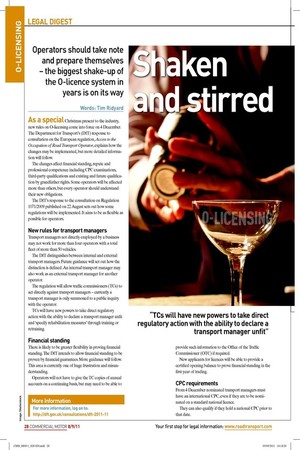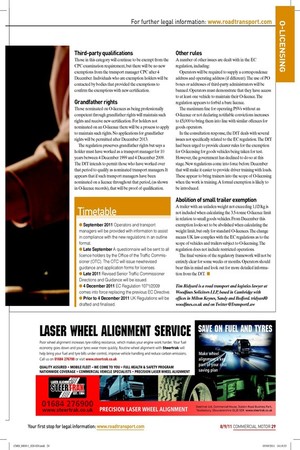Shaken and stirred
Page 22

Page 23

If you've noticed an error in this article please click here to report it so we can fix it.
Operators should take note and prepare themselves – the biggest shake-up of the O-licence system in years is on its way
Words: Tim Ridyard As a special Christmas present to the industry, new rules on O-licensing come into force on 4 December. The Department for Transport’s (DfT) response to consultation on the European regulation, Access to the Occupation of Road Transport Operator, explains how the changes may be implemented, but more detailed information will follow.
The changes affect inancial standing, repute and professional competence including CPC examinations, third-party qualiications and existing and future qualiication by grandfather rights. Some operators will be affected more than others, but every operator should understand their new obligations.
The DfT’s response to the consultation on Regulation 1071/2009 published on 22 August sets out how some regulations will be implemented. It aims to be as lexible as possible for operators.
New rules for transport managers
Transport managers not directly employed by a business may not work for more than four operators with a total leet of more than 50 vehicles.
The DfT distinguishes between internal and external transport managers. Future guidance will set out how the distinction is deined. An internal transport manager may also work as an external transport manager for another operator.
The regulation will allow trafic commissioners (TCs) to act directly against transport managers – currently a transport manager is only summoned to a public inquiry with the operator.
TCs will have new powers to take direct regulatory action with the ability to declare a transport manager unit and ‘specify rehabilitation measures’ through training or retraining.
Financial standing
There is likely to be greater lexibility in proving inancial standing. The DfT intends to allow inancial standing to be proven by inancial guarantees. More guidance will follow. This area is currently one of huge frustration and misunderstanding.
Operators will not have to give the TC copies of annual accounts on a continuing basis, but may need to be able to provide such information to the Ofice of the Trafic Commissioner (OTC) if required.
New applicants for licences will be able to provide a certiied opening balance to prove inancial standing in the irst year of trading.
CPC requirements
From 4 December nominated transport managers must have an international CPC, even if they are to be nominated on a standard national licence.
They can also qualify if they hold a national CPC prior to that date.
Third-party qualifications
Those in this category will continue to be exempt from the CPC examination requirement, but there will be no new exemptions from the transport manager CPC after 4 December. Individuals who are exemption holders will be contacted by bodies that provided the exemptions to conirm the exemptions with new certiication.
Grandfather rights
Those nominated on O-licences as being professionally competent through grandfather rights will maintain such rights and receive new certiication. For holders not nominated on an O-licence there will be a process to apply to maintain such rights. No applications for grandfather rights will be permitted after December 2013.
The regulation preserves grandfather rights but says a holder must have worked as a transport manager for 10 years between 4 December 1999 and 4 December 2009. The DfT intends to permit those who have worked over that period to qualify as nominated transport managers. It appears that if such transport managers have been nominated on a licence throughout that period, (as shown in O-licence records), that will be proof of qualiication.
Other rules
A number of other issues are dealt with in the EC regulation, including: Operators will be required to supply a correspondence address and operating address (if different). The use of PO boxes or addresses of third-party administrators will be banned. Operators must demonstrate that they have access to at least one vehicle to maintain their O-licence. The regulation appears to forbid a bare licence.
The maximum ine for operating PSVs without an O-licence or not declaring notiiable convictions increases to £5,000 to bring them into line with similar offences for goods operators.
In the consultation response, the DfT deals with several issues not speciically related to the EC regulation. The DfT had been urged to provide clearer rules for the exemption for O-licensing for goods vehicles being taken for test. However, the government has declined to do so at this stage. New regulations come into force before December that will make it easier to provide driver training with loads. These appear to bring trainers into the scope of O-licensing when the work is training. A formal exemption is likely to be introduced.
Abolition of small trailer exemption
A trailer with an unladen weight not exceeding 1,020kg is not included when calculating the 3.5-tonne O-licence limit in relation to small goods vehicles. From December this exemption looks set to be abolished when calculating the weight limit, but only for standard O-licences. The change means UK law complies with the EC regulations as to the scope of vehicles and trailers subject to O-licensing. The regulation does not include restricted operations.
The inal version of the regulatory framework will not be entirely clear for some weeks or months. Operators should bear this in mind and look out for more detailed information from the DfT. ■












































